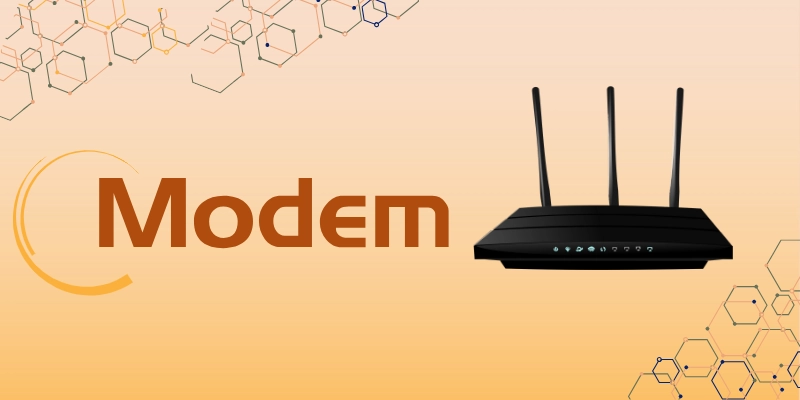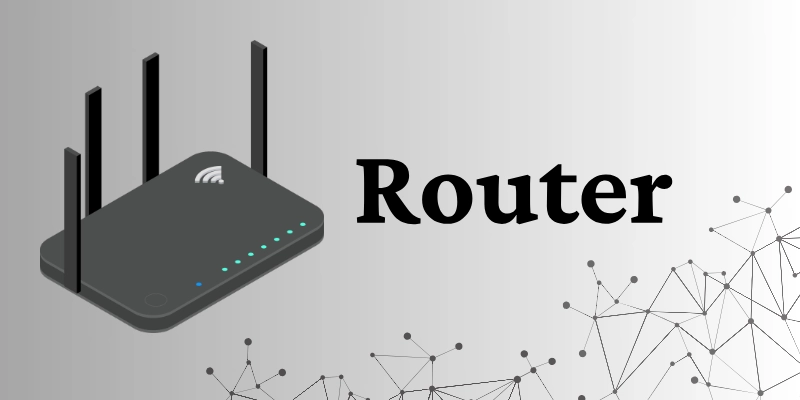Difference Between Modems and Routers: Complete Guide
Published: 4 Sep 2025
Have you ever wondered why some people talk about modems while others insist you need a router? The truth is, these two devices are not the same, even though they’re often mentioned together.
Understanding the differences between modem and router will help you see how each one works, why both are important, and how they keep your devices connected. Many people confuse the two because they look alike, small boxes with blinking lights tucked away in a corner of the home.
In this article, we’ll break down the differences between modem and router step by step, so you’ll never mix them up again.
Differences between modem and router
The following points break down the key differences between a modem and a router in simple terms. Understanding these will help you clearly see how each device plays its own unique role in your home network.
- Function
- Connection
- Number of Devices Supported
- Network Creation
- Security
- Data Translation
- Internet Dependency
- Port and Cable Differences
- Placement in Your Network
- Hardware Combo Option

1. Function
Let’s start with the basic role each device plays in your network:
- Modem: Brings the internet connection from your ISP into your home. It acts as the gateway.
- Router: Does not bring in the internet. Instead, it takes the internet from the modem and spreads it wirelessly or via cables to multiple devices (like your phone, laptop, or smart TV).
2. Connection
Now, let’s look at how each device connects and where they fit in your internet setup:
- Modem: Connects directly to the ISP’s service line (coaxial cable, DSL phone line, or fiber optic cable).
- Router: Cannot connect to the ISP line directly. It connects to the modem (usually via an Ethernet cable in the WAN/Internet port) and then connects to your devices.
3. Number of Devices Supported
Here’s how many devices each one can handle at the same time
- Modem: Supports only one device at a time. If you plug a computer into it, only that device will have internet access.
- Router: Designed to handle multiple devices at once, both wired (LAN ports) and wireless (Wi-Fi).
4. Network Creation
Next, let’s see which device actually builds your home network:
- Modem: Does not create a local network. It only provides internet access.
- Router: Creates your Local Area Network (LAN), enabling devices to connect to the internet and communicate with each other (e.g., streaming from laptop to TV).
5. Security
Security is another big difference between the two:
- Modem: Provides little to no security. Its role is limited to signal translation.
- Router: Offers strong security features like firewalls, Wi-Fi encryption (WPA3), and parental controls.
6. Data Translation
Now, let’s talk about how each device handles and translates data:
- Modem: Converts (modulates/demodulates) analog signals from your ISP into digital signals for your devices, and vice versa.
- Router: Does not translate signals. It routes digital data between your devices and the modem, ensuring data reaches the correct device.
7. Internet Dependency
When it comes to getting online, their roles aren’t equal:
- Modem: Essential for internet access without it, you cannot connect online.
- Router: Cannot connect to the internet on its own. It must be connected to a modem (except in a modem-router combo).
8. Port and Cable Differences
The ports and cables also make it easy to tell them apart:
- Modem: Usually has two main ports one for the ISP line (coaxial/DSL/fiber) and one Ethernet port for a single device or a router.
- Router: Has one WAN/Internet port (to connect to the modem) and multiple LAN ports for devices. It also has antennas (internal or external) to broadcast Wi-Fi.
9. Placement in Your Network
The position of each device in your setup always follows the same order:
- Modem: Always comes first in the setup (ISP Line → Modem).
- Router: Always comes second (Modem → Router → Devices).
10. Hardware Combo Option
Finally, let’s look at the option of combining both devices into one:
- Modem: Can be purchased as a standalone device.
Router: Can also be bought separately. However, ISPs often provide a modem-router combo (gateway) that combines both functions in one device.

Modem vs Router: Key Differences at a Glance
For a quick and clear overview, here is a direct comparison:
| Feature | Modem | Router |
| Primary Function | Bring internet into your home from the ISP. | Spreads that internet connection to all your devices. |
| Connection To | Connects directly to the ISP line (cable, DSL, fiber). | Connects to the modem, and then to your devices. |
| Device Support | Supports only one wired device. | Supports multiple wired and wireless devices. |
| Network Creation | Does not create a network. Provides internet access. | Creates your local Wi-Fi and wired network (LAN). |
| Security | Offers very basic or no security features. | Provides a firewall, encryption, and parental controls. |
| IP Address | Get a public IP address from your ISP. | Assign local, private IP addresses to your devices. |
Modem vs Router: Which One Do You Need?
So, which device is for you? The answer is simple.
- You need a modem. It is non-negotiable. You cannot access the internet without one.
- You need a router if you have more than one device. If you want Wi-Fi for your phone and tablet, or if you have multiple computers, a gaming console, and smart home devices, you absolutely need a router to share the connection and provide security.
For most everyday internet users and households with many devices, you need both. A modem-router combo is often enough for basic use and is the most convenient option. However, power users, gamers, and those in larger homes often prefer separate, higher-quality devices for better performance and more control.
Conclusion
The modem and router may look similar, but their functions are very different. The modem connects your home to the internet, while the router distributes that connection, adds security, and manages multiple devices.
In short:
- Modem = Internet access point
- Router = Network manager
Understanding the difference between modems and routers helps you build a faster, more secure, and more reliable home or office network.
FAQs
Following are the most frequently asked questions on modem vs router. These answers will help you understand their roles, functions, and key differences clearly.
The main difference between a modem and a router is that a modem connects your home to the internet by communicating with your ISP, while a router distributes that internet connection to multiple devices through wired and wireless networks.
Yes, in most cases you need both. The modem provides internet access from your ISP, and the router enables connectivity for multiple devices, adds wireless capability, and offers extra security features like firewalls and encryption.
No. A modem and a router are different types of network devices. The modem handles signal transmission and IP address assignment from your ISP, while the router manages data routing within your home network.
Yes, but with limitations. A modem alone can connect a single device via a wired connection, but it won’t provide wireless capability or allow multiple devices to access the internet at the same time. That’s where a router becomes essential.
A modem-router combo (also called a gateway) is a single device that combines both functions: internet access through modulation and wireless connectivity for multiple devices. It’s convenient but less flexible for upgrades compared to separate devices.
Both are important but for different reasons. A modem is essential for internet access because it connects to your ISP, while a router is crucial for sharing that connection with multiple devices and adding features like wireless capability, security, and data routing.
Yes, in most cases you can replace your ISP-provided devices with your own. Many users buy separate modems and routers to get better performance, more control, and advanced features. However, always check compatibility with your ISP before replacing.
A router doesn’t increase your internet speed beyond what your ISP provides. However, a modern router can improve connectivity and signal transmission, reduce bottlenecks, and provide faster wireless performance (especially with Wi-Fi 6 or mesh systems).
You can use two routers with a single modem to extend coverage or create separate networks. One router connects directly to the modem, while the second can be used as an access point or range extender for better LAN vs WAN management.
If you experience slow speeds, frequent disconnections, or poor wireless capability, your device may be outdated. For example, older modems may not support higher ISP speeds, and old routers may lack modern features like dual-band, mesh networking, or advanced IP address assignment options.

- Be Respectful
- Stay Relevant
- Stay Positive
- True Feedback
- Encourage Discussion
- Avoid Spamming
- No Fake News
- Don't Copy-Paste
- No Personal Attacks

- Be Respectful
- Stay Relevant
- Stay Positive
- True Feedback
- Encourage Discussion
- Avoid Spamming
- No Fake News
- Don't Copy-Paste
- No Personal Attacks





